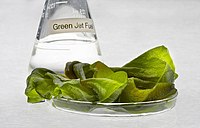
Photo from wikipedia
Wastewater treatment using algae is a promising approach for efficient removal of contaminating nutrients and their conversion into useful products. Monocultures of filamentous algae provide easier harvesting compared to microalgae,… Click to show full abstract
Wastewater treatment using algae is a promising approach for efficient removal of contaminating nutrients and their conversion into useful products. Monocultures of filamentous algae provide easier harvesting compared to microalgae, and better control of biomass quality than polyculture systems such as algal turf scrubbers. In this review, recent research into wastewater treatment using freshwater filamentous algae is compiled and critically analysed. Focus is given to filamentous algae monocultures, with key relevant findings from microalgae and polyculture systems discussed and compared. The application of monocultures of filamentous algae is an emerging area of research. Gaps are identified in our understanding of key aspects important to large-scale system design, including criteria for species selection, influence of nutrient type and loading, inorganic carbon supply, algae-bacteria interactions, and parameters such as pond depth, mixing and harvesting regimes. This technology has much promise, however future research is needed to maximise productivity and wastewater treatment efficiency.
Journal Title: Bioresource technology
Year Published: 2019
Link to full text (if available)
Share on Social Media: Sign Up to like & get
recommendations!